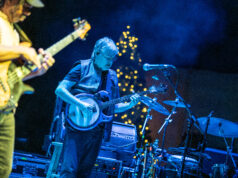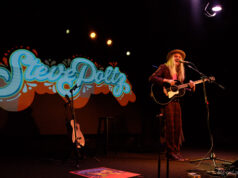Jonathan Richman (Photo by Angelina Castillo)
As I watched Jonathan Richman perform at the Lincoln Theater Friday night, it struck me how he has much in common with the late comedian Andy Kaufman. To be sure, Richman doesn’t share Kaufman’s penchant for playing games with and “working” his audience, to use a term from the parlance of professional wrestling, which Kaufman loved and was involved with.
But there’s a sweetness and a gentleness to both, which has sometimes been characterized as “childlike” or, in, Richman’s case maybe “simplistic.”
The “childlike” label seems fair, as Richman looks at the world with the same optimistic wonder that was present in Kaufman. But this should not be confused with simplicity, or naivete, as Richman — like Kaufman — is a highly intelligent man. He’s a fluent speaker of French, and he appreciates poetry so much that he has adapted multiple pieces to song. His set at the Lincoln Theatre on Oct. 14 included “He Gave Us Wine To Taste It,” based on a poem by the 13th-century Persian mystic, theologian, and scholar Rumi. He also performed a piece based on writing by the 15th-century Indian poet Kabir.
A native Bostonian — his thick accent is unmistakable — Richman grew up thinking he would become a painter, before turning his attention to music. In his late teens, he traveled to New York in search of his favorite band, The Velvet Underground. He ended staying on the couch of the band’s manager while he tried to start a music career. It didn’t work out, and he moved back to Boston. With the Modern Lovers, he released he first album in 1976, followed by a second a year later. These early albums were a mixture of proto-punk and rock’n’roll, a style he would deviate from in the course of his career.
Over the past several decades, Richman has eschewed loudness and electricity for a softer, acoustic style. At the Lincoln on Friday, he was accompanied on drums by Tommy Larkins, with whom he spoke of sharing an almost telepathic bond. Jonathan emphasized they work without a set list, and praised Larkins for his ability to intuitively follow him and guess where he’s going.
Richman eschewed much of his early catalog, only including “That Summer Feeling,” “Affection,” and “The Fenway” from his Modern Lovers era. The set focused on the last several decades of his 50-year career. It wasn’t a conventional set; in addition to the standard banter between songs, many of the tunes were interspersed with spoken word tangents. At times, it wasn’t clear exactly where one song ended and another began. There was more than a little of vaudeville in his performance, especially when he danced during “New Kind of Neighborhood.”
Stream “New Kind of Neighborhood” by Jonathan Richman on YouTube:
The set began with “We’ll Be The Noise, We’ll Be The Scandal,” followed by “That Summer Feeling.” As Jonathan sang in French later (“Le printemps des amoureux est venu”), he interjected bits of English: “The spring tide of the lovers has returned so this dust bowl can be a garden once more,” and he compared the lovers’ smell to “sweat and salt and old fruit.” Introducing “Shameless, Shameless,” he shared his despair at how someone had stolen his bells right off the stage at a show in Athens, Georgia.
Jonathan told the audience about his “want to save the world problem.” Sometimes, he said, he’ll go into a restaurant where no one is eating out of sympathy, only to be reminded there is a reason there’s no one in there. Jonathan has a big heart, which is evident in his the work he’s long done playing music for children in hospitals. I can relate to Jonathan; I find my heart wrenched easily, so much so that I have to avoid certain things, especially certain commercials on cable, or my day can just be ruined. I often feel like I should do more for the world and for others, but I’m also struggling, pretty hard, just to take care of myself. There are days when I have trouble with really basic stuff, like remembering that sometimes you have to put a lid on a pot of water to get it to boil.
“Everyone Loves Dolly,” paid tribute to country music’s queen. An instrumental, “Guitar in Orange and Drums in Pale Purple,” took its title from the colors the music evoked for Jonathan and Tommy. “The Fenway” conjured Jonathan’s memories of the ballpark where he went to see his beloved Red Sox. I’m not a baseball fan, but art based around the sport is almost its own genre, and I truly love some of it, like Joseph Kinsella’s magic realist novel Shoeless Joe, which became Field of Dreams. (I suspect there are more stories and movies about baseball than other sports because the relatively glacial pace and lower level of action make it a lot easier to depict.)
The set also included “O Mind! Let Us Go Home!”, a Spanish poem set to music, “¿A qué venimos sinó a caer?”, and ended with “Cold Pizza.” For his encore, Jonathan sang “I Had To See the Harm I’d Done Before I Could Change.” It was an interesting choice, a bit more somber and more serious than much of the set, for him to end the evening with. Beneath all the silliness and the shtick, though, there’s a real serious and serious intelligence to Jonathan Richman, and he’s one of the unique figures, even in music, a world full of unique figures.






